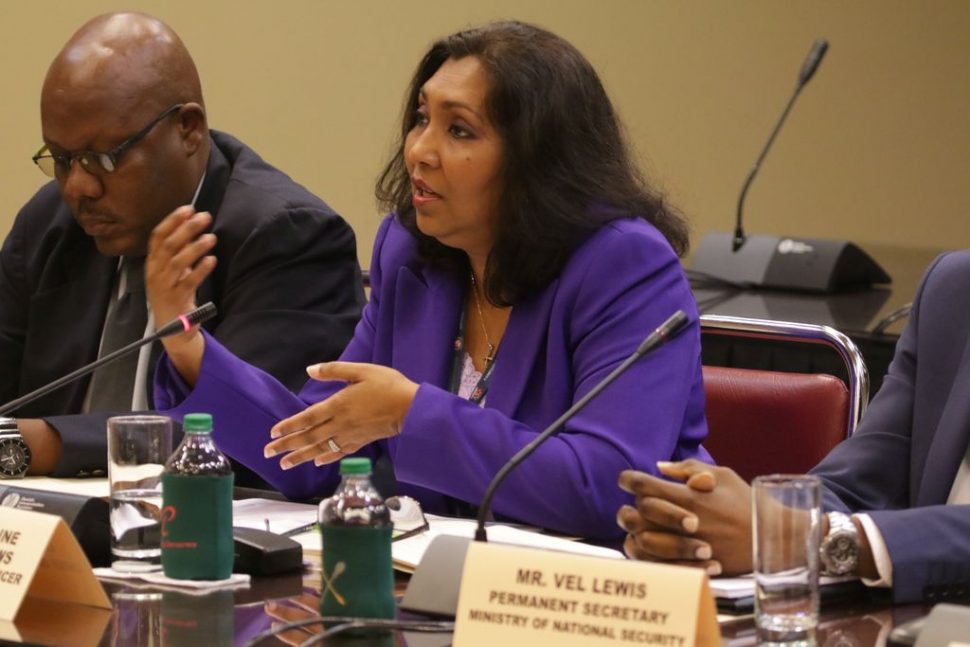(Trinidad Guardian) Chief Immigration Officer Charmaine Gandhi-Andrews admits there has been an increase in illegal immigrants to this country, but she is also admitting she is not in a position to give exact numbers “because a lot of the persons who have entered we know nothing about.”
But she is admitting that over the last year most of those who are entering illegally are Venezuelans.
The influx of illegal immigrants has created more than one problem for Gandhi-Andrews, who admits she has had to act “ultra vires the Immigration Act” because it makes no provision for asylum seekers or refugees.
Gandhi-Andrews was among Ministry of National Security officials who yesterday appeared before a Joint Select Committee of Parliament on Equality and Diversity, which examined the issue of the treatment of detainees at the Immigration Detention Centre (IDC) at Aripo.
As of yesterday morning, there were 118 detainees at the IDC. Of that number, 75 per cent entered the country illegally and most of them are Venezuelan nationals who, apart from entering illegally, have no documentation.
Responding to a question from committee chair Nyan Gadsby-Dolly on the number of illegal people in the country, Gandhi-Andrews said while there has been an increase in people entering illegally, “actual number we won’t be able to give because a lot of the persons who have entered we know nothing about.”
However, she said 19,000 Venezuelans had entered through legal ports of entry and of that number 17 per cent had overstayed their time.
Gandhi-Andrews said some of those persons are currently housed at the IDC while others were assessed and having determined that they have “some place to stay and somebody who is willing to support them while they are here, we would consider the risk and put the person on an Order of Supervision,” which she explained “is akin to bail.”
She explained that in order to determine whether someone would get an order of supervision, they look at the nature of the breach of the Immigration Act. “The Chief Immigration Officer would be able to determine whether or not that person can be released on an order of supervision and under what terms and conditions,” she said.
There are currently 1,700 persons on orders of supervision, she noted. Those persons would be released on a security bond which varies according to their nationality, she said.
Giving an example of this, she said someone from Guyana may be required to post a $2,000 security bond while someone from an African country may be required to post a $30,000 bond.
That cost, she said, does not take into account the cost of the detention or repatriation.
Gandhi-Andrews told the committee that persons who are placed under supervision are required to report to the Immigration Department on a regular basis between once a week or once a month.
Persons who are placed in the detention centres “are considered high risk or awaiting some form of identification for them and somebody to come forward to say yes we are willing to support them, we are willing to post a security bond.”
Asked how long it would take for a detainee to be repatriated, she said it all depends on the cooperation of the detainee, whether they have to get assistance to get documentation, to determine the nationality of the person, whether the person would buy the ticket or the Government would have to buy it and some airlines require escorts for the deportees.
The process can take anywhere from one week to a month, she said.
Under the Immigration Act, a person entering the country illegally is liable to a fine of $50,000 and three years’ imprisonment and for a second offence, the fine is $100,000 or five years’ imprisonment.
No laws to help asylum seekers
Gandhi-Andrews yesterday admitted that the influx of illegal immigrants is an “emerging phenomena” in the region and there are currently no laws in place to deal with asylum seekers and refugees.
“The current Immigration Act does not deal with these persons,” Gandhi-Andrews told a Joint Select Committee of Parliament on Equality and Diversity.
It is for this reasons she said she sometimes finds herself “between a rock and a hard place.”
Gandhi-Andrews said while she had allowed “certain things to happen” in the past, she was “running ultra vires to the Immigration Act but in the same interest of human rights.”
But she is hoping this will be addressed soon.
“We have been meeting and we have gotten to the point where there is draft legislation and a draft policy,” Gandhi-Andrews told the committee.
The United Nations Refugee Agency UNHCR estimates there are close to 7,000 asylum seekers in this country on the grounds that they fear persecution or fear of returning to their country.
The Living Water Community is the implementing partner of the UNCHR and legal adviser to Living Waters Gina Maharaj suggested there was a need for “better access to the IDC so that we can interview these persons to know whether they want to be registered as asylum seekers.” Gandhi-Andrews said the arrangement with Living Waters and UNHCR is that whenever they want to see somebody from the IDC an arrangement is made. But she said if Living Waters “want free access that is a different conversation” and that decision would have to be made “elsewhere.”
According to Gandhi-Andrews, there is also a security issue to consider.
“There are times when the situation at the IDC can be volatile. What we have observed is that when any individual from the outside goes in the detainees start to act up,” she said.










